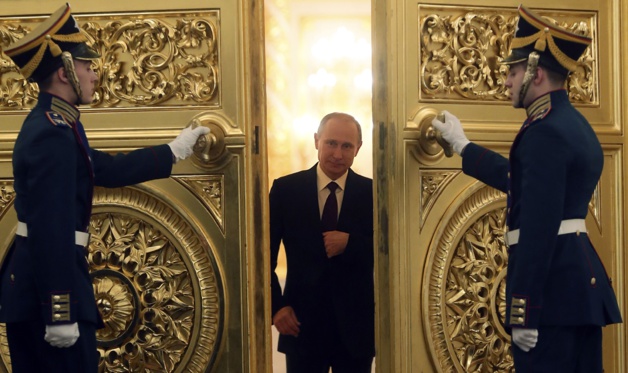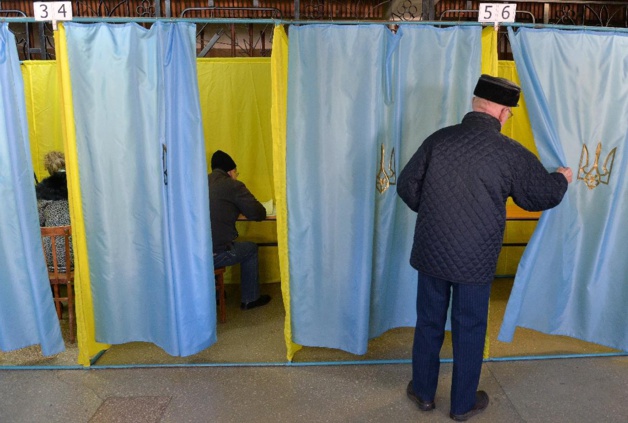Even if the recent Ukrainian legislative elections place pro-European parties ahead and assure a strong majority to president Petro Porochenko - who will now be able to implement the projects of liberal and democratic reforms announced - they highlight the recent split within the country. In fact, the twelve Crimean districts have declared their independence, along with fifteen other pro-Russian districts in the East of the country that did not participate in the Rada elections, the National Parliament. Thus, there will now be 424 deputies - unlike the usual 450 - who will sit in Parliament. Among them, many newcomers to the political field: militants and journalists who took part in the demonstrations of Maïdan last winter –such as Dmytro Laroch, ultra-nationalist leader of the Pravy Sector party- and veterans who fought on the Eastern border.
For all that, the polls seemed to favour the new pro-Western duo that has been leading the country for the past 6 months. Polls conducted by President Petro Porochenko and his Prime Minister Arsenii Iatseniouk respectively got 21.69% and 21.63% of votes. Historically speaking, it is the first time in 23 years of Ukrainian independence that the Communist party, like pro-Russian parties, did not reach the 5% threshold necessary to sit in Rada. President Porochenko intends to create a broad coalition -deliberately facing towards Europe - in which Ioulia Timochenko could even participate, despite her disappointing results of 5.6%.
Besides those encouraging and hopeful results comes a certain amount of structural and short-terms difficulties that could truly handicap the newly elected representatives’ mandate. On the one hand, the Ukrainian elections suffered from a low turnout, with a feeble participation rate of 52%. Even if the OSCE declared them to be “up to democratic standards”, corruption and political oligarchy still reigns over the country. In order to satisfy the population, who are waiting for effective and in-depth reforms, the government will have to settle those as they are assuring support to the multitude of new political movement that recently accessed power. On the other hand, after putting economic pressure on the country, Moscow ceased gas exports towards Ukraine in June. And while the temperature recently dropped to below zero, economical perspectives are equally dropping to negative: the national currency – the hryvnia- is free falling. Its exchange rate suffered from an 11% decline since the beginning of the war, which has led to an important reduction of purchasing power.
A poll giving a half-smile
East Ukrainian voters were called to polls on 2nd November. Citizens from the new Popular Republic of Donetsk (PRD) and Popular Republic of Louhansk (PRL) could elect their “popular councils” and their respective leaders, an old song that sounds like the former Soviet Union. Even if Roman Lyagin, in charge of the Central Election Commission, assures that “everything turned out better than we expected”, numerous irregularities in various polling stations were brought to light. He highlighted the unaccountable self-determination referendum that occurred last year in May when results were released before the beginning of the analysis.
Last Sunday, outside of the polling stations, voters were given fruit and vegetables by the different candidates’ campaign teams. In the end, candidates were very few, as many failed their application because of a procedural flaw, or had to stand down due to threats and pressure. Negotiations and bargaining occurred around the position of some candidates, making this vote a true clash of tribes, a simple sharing of powers between political groups. It is a game where all is permissible, and the incentive is doubled as it means attaining political leadership of the region, the right to levy taxes, and also to get favours and help from the Russians.
Russia is indeed the last ally of the Eastern Ukrainian region since it switched to the Russian time zone, now following Moscow’s clock. The Kremlin is thus the only power to recognize these elections. The EU, however, under the leadership of Frederica Mogherini, new chief of European diplomacy, considers it as “a new obstacle to peace in Ukraine”. Moscow seems determined to freeze over the Ukrainian conflict, the same way as in Transnistria, by supporting the pro-Russians in order to strengthen and reinforce its position in Crimea and in Donbass.
A dinner of fools
« When you sit at the table with the devil, you can do nothing but take a spoon and have dinner with him.” A quotation from Michael Stürmer, German political specialist and journalist, who told me about the evening he spent with Vladimir Putin in Sotchi on Sunday 26th October, during the meeting at the Valdaï club.
The Western position with regards to the Kremlin says a lot about the subtlety of diplomatic relations. Everyone finds it easy to demonize Putin; however, France does not think twice about selling her warships to Russia, while Great Britain prefers to deal with them in the field of high-technology, taking advantage of the technological gap between Russia and Western countries; all of it under the benevolent gaze of the USA. The recent Ukrainian crisis, however, has crystallized the East-West rift, and is amplified by the crises in Libya and Syria, making it look like a Cold war. The three main characteristics of that time, theorised by Raymond Aron, are still valid nowadays in a world that tends to be more and more global, nuclear and bipolar, the only difference being that it is on the brink, disturbed and unpredictable. And in fact, is potentially more dangerous.
In the same way that 9/11 brought Russia and the West – mainly America – together, united against a common enemy (terrorism and radical Islam), the fight against Islamic State could now become a rallying point between Western and Eastern blocs, after the divisions caused by the war in Syria. The risk would be that a US-Russian coalition would be underpinned by a condition: that we leave Ukraine in the hands of the Russians. The Kremlin should indeed support the fight against the expansion of radical Islam, given the spread of the so-called DAESH fighters, and their expansion into Chechnya and more widely in the Caucasian region. Yet, to abandon Eastern Europe to President Putin would be a serious mistake, and his ambitions could surpass the Ukrainian situation and stretch out to all countries of the former soviet Union and the old Tsarist tradition. Russia’s historical ambitions, whether imperial or imperialistic, show that she is not quite finished threatening the peace of Eastern European people.
When competitiveness goes hand in hand with independence
On the 27th October, when the Norwegian gas container from the Statoil company came alongside the Lithuanian port of Klaipeda (located on the Baltic sea), it was welcomed with national songs and flags. It did not bring only cliquefied gas within its holds, but a true promise to independence, breaking the Russian company Gazprom monopoly on gas. The name that they gave to this Norwegian container was Independence, symbolizing a great deal for this small country and its Baltic neighbours. The large ethnic minority of Russians living there, about 26% of the population, could indeed wake up after the Ukrainian civil war and plunge the region into a “Crimean scenario”.
According to the Lithuanian president Dalia Grybauskaite, this new competitiveness is a “strategic geopolitical project that may decide the future of the whole region”; the Russians would then no longer dictate gas consumption prices and political decisions according to what benefits the Kremlin. Statoil will provide Lithuanian gas this winter and could expand its market to other Baltic countries such as Estonia and Latvia. The same way, Lithuania is planning on building a pipeline to Poland in 2014 ; another way to leave the politico-economic Russian-influenced zone, which is a true example for all former Soviet Union countries.
As for Ukraine, the Western will to maintain the stability of the country should not be seen as a Europeanisation of the region, which risks adding pressure on the former Soviet Union countries regarding their identity issues. National debates are divided between a democratic and attractive Europe, and the Russian big brother, which prevents all sorts of development and lessens chances for countries to become independent. In such a context, it is impossible to solve issues regarding corruption and oligarchy. Whether it is the Russian violation of international law and treaties or pressure from Europe, the stability and integrity of Ukrainian territory will remain threatened if politics and members of civil society do not focus on national debates, and we could well witness a “Yugoslavian style” break-up of the nation.































